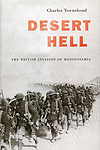
Desert Hell: The British Invasion of Mesopotamia, by Charles Townshend, Belknap Press, Cambridge, Mass., 2011, $35
While reading Charles Townshend’s new book, Desert Hell, one cannot help but reflect on George Santayana’s famous observation that “those who cannot remember the past are condemned to repeat it.” The parallels between the British experience in what was then known as Mesopotamia between 1914 and 1925 and the American experience in Iraq between 1990 and today are difficult to ignore. Both nations’ reasons for invading the country were much the same: to protect their access to the region’s oil and prevent it from falling under the influence of either Russia or Persia (or Iran, as it is now known). Both the Unit-ed Kingdom and the United States went in believing they could accomplish the mission with scant trouble, and neither had an exit strategy. Both countries tried to leave behind a national state in a region that was little more than a patchwork of rival tribal and religious enclaves. Both powers relied heavily on modern technology, particularly airpower; and Britain’s reliance upon the Royal Air Force to police Iraq from the air in the 1920s makes an interesting comparison with the United States’ use of drone technology today.
Mesopotamia means “between the rivers” in Greek, a language spoken by neither the inhabitants nor the ruling Ottoman Turks. When Britain and Turkey went to war in 1914, the British believed the Ottoman Empire was so weak that it was ready to fall apart. Consequently, the British sent a military expedition from India up the Persian Gulf to occupy oil-rich Mesopotamia before it fell into the hands of either the Russians to the north or the Persians to the east. So little thought had gone into the invasion that the British simply employed forces diverted from the Western Front. “Messpot,” as British Tommies came to call the region in their Kiplingesque manner, developed into a grueling military campaign and police action that dragged on for more than a decade, long after World War I had ended.
In the end the British did succeed in setting up a state in the war-torn region. Nevertheless, as the author explains, we are living today with the repercussions of what they did in Iraq in the teens and ’20s. It was the British, for example, who recognized the independence of the Emirate of Kuwait, the occupation of which by Iraq touched off the 1991 Gulf War. It was also the British who forced the ethnic Kurds to become submerged in Iraq without an independent nation of their own. Britain left behind a king reigning over a kingdom that had neither ethnic or religious unity nor a national identity.
Desert Hell is an insightful study of the military and political strategies played out in Iraq between 1914 and 1925. Beyond merely being a timely work, it is actually a pity this book didn’t appear earlier.
—Robert Guttman




